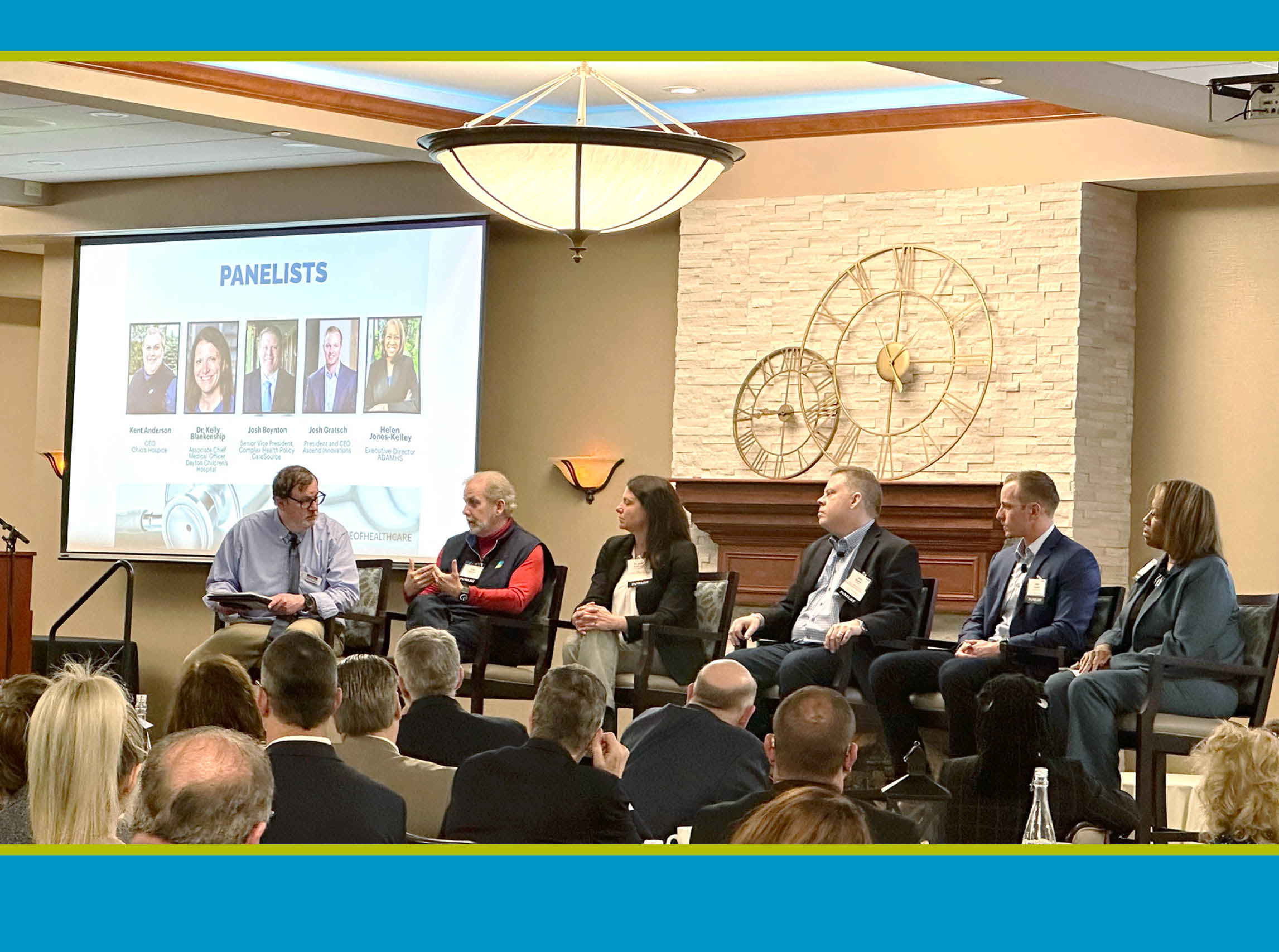
Ohio’s Hospice CEO Participates as Panelist in Dayton Business Journal’s Future of Health Care Event
Kent Anderson, CEO of Ohio’s Hospice was one of five regional healthcare thought leaders who participated in the Dayton Business Journal’s panel discussion, “The Future of Health Care,” on Feb. 16, at the NCR Country Club in Kettering, Ohio.
Sarah Hackenbracht, president and CEO of the Greater Dayton Area Hospital Association (GDAHA) was the keynote speaker. In addition to Anderson, the panelists included Dr. Kelly Blankenship, associate chief medical officer at Dayton Children’s Hospital; Josh Boynton, senior vice president of Complex Health Policy at CareSource; Josh Gratsch, president and CEO of Ascend Innovations; and Helen Jones-Kelley, executive director of Montgomery County Alcohol, Drug Addiction, and Mental Health Services (ADAMHS).
Moderated by Caleb Stephens, editor-in-chief of the Dayton Business Journal, the panelists answered various questions, including issues in health care, pediatric mental health concerns, new technologies, the opioid crisis, hospice care, and the future of healthcare among others.
Anderson spoke about the aging population of the nation. He discussed how the future of healthcare will be focused on allowing people to age in the place where they call home safely with grace and dignity. “I see more that the location of the delivery of care and services across healthcare, from pediatric to end-of-life care, is going to be more and more focused on allowing that to happen in the environment where the patient and the family call home,” he said.
My hope for you is to be intentional in making positive memories every day with those that you love. That connectedness is going to help us learn to be preventative around mental health challenges and issues.
– Kent Anderson, CEO, Ohio’s Hospice
This is Anderson’s 30th year in healthcare and his 13th year in the Dayton community. “Ohio’s Hospice of Dayton was one of the first five hospices founded in the United States,” he said. “It has been serving the greater Miami Valley since 1978.”
He spoke about innovation and leadership. “The innovation, the capability, and the leadership that we have in this community is some of the best in the country, if not the best,” he said. “It’s something that you should be proud of.”
As the population of the nation ages, Anderson hopes that healthcare leaders continue to work together and collaborate. “What I hope for is that we continue to bring our resources and that innovative spirit together more and more, and we create a healthcare system that heretofore is very transactional, and we put the patient at the center,” he said. “If you think about the human cell, one of the unique properties is the membrane. It’s semi-permeable. It puts good things in and takes good things out. That’s the healthcare system that we need. It looks at the patient holistically, not only their healthcare.”
As a not-for-profit hospice organization, Ohio’s Hospice’s core competencies are caring for people living with frailty, chronic illness, serious illness, complex medical needs, and terminal illness. As the country ages, more and more people will be living longer with more chronic illness. The core competencies of the mission of Ohio’s Hospice will continue to be relevant and necessary for the foreseeable future.
Anderson envisions a healthcare system that takes into account social and economic inequities. “So, we can have the best plan of care for a patient,” he said. “But that plan can is compromised or undermined if we’re not looking at housing insecurities, food insecurities, and access to care and services defined by that plan.
He also spoke about palliative care, which is specialized medical care for individuals living with a serious or chronic illness. Palliative care seeks to improve the quality of life for the patient and their family. He explained how most people, as they get toward the end of their life, want to focus on the quality of life defined by them.
“In hospice, we focus on end-of-life care,” he said. “But we also have a whole other program around palliative care, which allows people to live and age with dignity, safely in a place where they call home.”
The innovation, the capability, and the leadership that we have in this community is some of the best in the country, if not the best. It’s something that you should be proud of.
– Kent Anderson, CEO, Ohio’s Hospice
Anderson was asked about the COVID-19 pandemic. He explained how the pandemic was difficult on those with chronic illness, serious illness or complex illness. “The impact of the last three years in unprecedented and really, really hard,” he said. “But we’re getting through it. I think Dayton — this community and this region — is going to show the country leadership that will reflect us being innovative and creating models that they will come to learn from and adapt themselves.”
Regarding health inequity, he commented on the use of data to help clinicians help patients. “Let the providers use data in a meaningful way to ensure that the plans of care and the access to care are optimized,” he said. “And my hope is that in the next five years, you’re going to see radical transformation.”
Anderson encouraged those in attendance to make positive memories with their loved ones. “So, my hope for you is to be intentional in making positive memories every day with those that you love,” he said. “That connectedness is going to help us learn to be preventative around mental health challenges and issues.”
Ohio’s Hospice of Dayton, an affiliate of Ohio’s Hospice, is a not-for-profit hospice provider. Since 1978, it has served patients and families in the Dayton region in their homes, extended care and assisted living facilities, and the Hospice House location in Dayton. A variety of grief support services are available to the entire community through the Pathways of HopeSM Grief Counseling Center. Support and education are provided by a team of counselors and social workers, all with significant experience and expertise in assisting grieving children, adolescents and adults. Pathways of Hope was established in 2002. Ohio’s Hospice of Dayton serves more than 1,000 patients and families daily, achieving national recognition for innovative services and outstanding care.
Ohio’s Hospice is a partnership of mission-driven, not-for-profit hospices in Ohio committed to a shared vision of strengthening and preserving community-based hospices. Members of Ohio’s Hospice share the values of serving each patient in an atmosphere of hospitality, respect and caring; attending to the social, physical and spiritual needs of each person we are privileged to serve; preserving and enhancing patient dignity; celebrating the life of each individual we serve; and reducing unnecessary suffering in the communities we serve.

